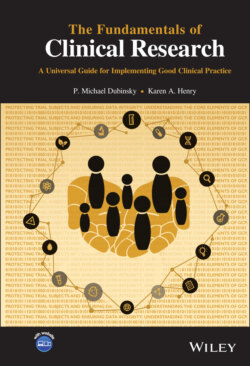Читать книгу The Fundamentals of Clinical Research - P. Michael Dubinsky - Страница 119
10.1 Introduction
ОглавлениеThe goal of clinical research is to determine the safety and effectiveness of investigational products to diagnose, treat, cure, or prevent a disease or relieve the symptoms of a disease in humans. Given the risks of new products for which the safety and efficacy are unknown, it is unethical to expose more numbers of people than are necessary to obtain sufficient information to evaluate the benefits versus the risks of the investigational product. Fortunately, we are able to use the scientific method of testing the product on a representative subset of individuals from the entire population and infer the findings to the larger population.
An individual who participates in a clinical trial, either as a recipient of the investigational product(s) or as a control is known as the subject or trial/study subject (ICH E6(R2) 1.57). In practice, alternative terminology are used to refer to the trial/study subject, such as participant, subject, volunteer, patient (for trial subjects who have the disease that is being studied), healthy volunteers (for trial subjects who are generally healthy and without the disease being studied; e.g., typically phase 1 pharmacokinetic studies).
The trial subject will be recruited by the investigator and will be administered the investigational product by the investigator. Today, anyone participating as a research subject in a clinical trial has certain rights (Chapter 19 Informed Consent and Other Human Subject Protection):
1 Fully informed consent and voluntarily participate in a trial without coercion
2 Confidentiality of their identity and health information
3 Compensation for trial‐related injury and for the time, effort, and expenses for their involvement in the study
4 Medical care for study‐related injury or intercurrent illness(es)
5 The ability to withdraw from the study at any time
In addition to the sponsor and investigator, trial subjects also have a role to facilitate ensuring protection of their rights, safety, and well‐being, the integrity of trial data, and trial compliance. Trial subjects do not have any formal GCP or regulatory obligations; however, they are asked to fulfill certain responsibilities during the consenting process for their participation in the trial. We must always keep in mind that that humans volunteering in a clinical trial are not required to and should not be coerced into doing anything. The investigator and sponsor do have the obligation to discontinue study treatment to a subject or withdraw the subject from the trial at any time if they determine that the subject's participation (or lack of participation and compliance with the protocol) puts the subject at risk for harm in the trial. It is also helpful if the trial protocol and trial operations are designed to facilitate the subject's compliance.
In this chapter, we will review the role and voluntary responsibilities of the trial subject, and quality by design concepts to facilitate the subject's compliance with trial requirements for their protection.
